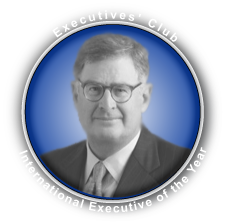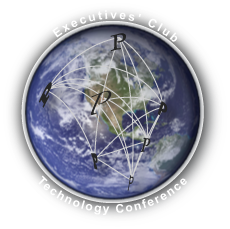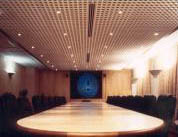Just Released—CSRA Market Advisory Highlights How I-Banks are Using Web 2.0 to Drive Competitiveness
![Enterprise 2.0 A Game-Changer for Investment Banks [Market Advisory]](http://rollyson.net/wp-content/uploads/2007/09/Mkt_Advisory.gif) This summer, “Enterprise 2.0” began to get legs as the new moniker for applying Web 2.0 to the enterprise, reflecting that pragmatists are raising their eyes for an exploratory glance. The market advisory shares how global investment banks are using Enterprise 2.0, and it suggests action steps for executives to take this year and next. Here is the executive summary and a few choice concluding points: This summer, “Enterprise 2.0” began to get legs as the new moniker for applying Web 2.0 to the enterprise, reflecting that pragmatists are raising their eyes for an exploratory glance. The market advisory shares how global investment banks are using Enterprise 2.0, and it suggests action steps for executives to take this year and next. Here is the executive summary and a few choice concluding points:
Enterprise 2.0 Enables Executives to Digitize and Monetize Collaboration for the First Time
This is so simple that many will miss it and open themselves to disruptive competition…
Banks increasingly use wikis, blogs and other Web 2.0 tools for mission-critical processes, as shown through the examples of Citi, DrKW, Morgan Stanley, ING and JP Morgan.. Enterprise 2.0 is a new term that denotes corporate adoption of Web 2.0 and social software tools. It offers investment banks an unusual opportunity to reduce risk and improve their earnings and profits by increasing returns on process, human and knowledge capital. However, Enterprise 2.0 also confronts banks […]
Converged Experience Presages Telecoms Transformation—Reexamining the Value Proposition
 CTOs Chris Rice (AT&T), Pieter Poll (Qwest), Mark Wegleitner (Verizon) and Matt Bross (BT) agreed that the discrete services that telecoms now offer would morph into a seamless, hyperavailable cloud of communications services. The converged experience will be seamless, feature-rich and accessible when, how and where consumers want. Telecoms’ ability to deliver will drive their stock prices in the near term and was the focus of the discussion. CTOs Chris Rice (AT&T), Pieter Poll (Qwest), Mark Wegleitner (Verizon) and Matt Bross (BT) agreed that the discrete services that telecoms now offer would morph into a seamless, hyperavailable cloud of communications services. The converged experience will be seamless, feature-rich and accessible when, how and where consumers want. Telecoms’ ability to deliver will drive their stock prices in the near term and was the focus of the discussion.
From an operational perspective, telecoms have been too focused on product/service P&L. Now they have to eliminate barriers between products, so the customer can have a context-appropriate, seamless experience. The first phase of this transformation is bundling existing services; however, the real value will come from innovating new services. All applications will be unified around an IP (Internet Protocol) infrastructure. Telecoms don’t need to integrate networks; they need to build networks that interoperate.
Between the lines and longer term, telecoms must reexamine their value propositions because we are coming to the end of the era in which custom applications and proprietary interfaces were necessary to integrate networks’ “islands of automation.” Network-centric software […]
Leadership, Trust and the Globally Integrated Enterprise reports on IBM’s CEO as he articulated a prescient vision for the enterprise—adapting to the Knowledge Economy.
 Samuel J. Palmisano, Chairman, President and Chief Executive Officer of IBM Corporation, outlined a new version of the enterprise at a lunch honoring him with the Executives’ Club of Chicago’s Thirteenth Annual International Executive of the Year Award April 12, 2007 at the Chicago Hilton. Entitled “Leadership, Trust and the Globally Integrated Enterprise,” his speech emphasized key points from his Summer 2006 article of the same name in Foreign Affairs. He was especially interesting to hear due to his experience with leading one of the world’s foremost global enterprises as well as his insight from serving global enterprises in every industry. Samuel J. Palmisano, Chairman, President and Chief Executive Officer of IBM Corporation, outlined a new version of the enterprise at a lunch honoring him with the Executives’ Club of Chicago’s Thirteenth Annual International Executive of the Year Award April 12, 2007 at the Chicago Hilton. Entitled “Leadership, Trust and the Globally Integrated Enterprise,” his speech emphasized key points from his Summer 2006 article of the same name in Foreign Affairs. He was especially interesting to hear due to his experience with leading one of the world’s foremost global enterprises as well as his insight from serving global enterprises in every industry.
Yesterday’s model for the global enterprise, the multinational corporation (MNC), looks increasingly outdated due to widespread adoption of standards-based technology, increasingly standardized work processes and a liberalizing regulatory environment. Today, knowledge-based resources are available globally, and the enterprise’s means to create value is choosing how and where to tap the resources to […]
Visions for Technology Leadership
 After Gary Forsee’s luncheon address, a diverse panel of executives took the stage to discuss global technology leadership. Hardik Bhatt, CIO of the City of Chicago, Steve Goldman, Director of Architecture, the Chicago Mercantile Exchange, Raymond Spencer, CEO of Kanbay International, and David Weick, Global CIO of McDonald’s, shared their visions for Chicago’s global role in the world. Janet Kennedy, Midwest General Manager of Microsoft, gracefully moderated the panel discussion. The Executives’ Club of Chicago’s quarterly Technology Conference took place March 8 at the Chicago Hilton. After Gary Forsee’s luncheon address, a diverse panel of executives took the stage to discuss global technology leadership. Hardik Bhatt, CIO of the City of Chicago, Steve Goldman, Director of Architecture, the Chicago Mercantile Exchange, Raymond Spencer, CEO of Kanbay International, and David Weick, Global CIO of McDonald’s, shared their visions for Chicago’s global role in the world. Janet Kennedy, Midwest General Manager of Microsoft, gracefully moderated the panel discussion. The Executives’ Club of Chicago’s quarterly Technology Conference took place March 8 at the Chicago Hilton.
“Getting global” can mean many things, and panelists hit the issue from many directions. I’ll venture that, more than anything, it means changing one’s mindset, focus and approach, all of which are difficult to measure. All panelists represented organizations that had had international operations for decades, so how is global different?
[…]
High Potential for Business Innovation
 Plus ça change* was the theme of The Executives’ Club of Chicago High Technology Conference December eighth, where an esteemed panel gave varying perspectives on Chicago’s importance as a technology center. William Avery of Brunswick Corporation, James O’Connor, Jr. of Motorola, Inc. and Ira H. Cohen of Goldman, Sachs & Co. spoke about technology from enterprise IT, mobile technology and investment points of view respectively. Prior to their prepared remarks, John Gentry of CSC Consulting outlined key results of the forthcoming Chicago Technology Outlook Survey, in which corporate technology leaders commented on IT trends for 2007 as well as Chicago’s role as a technology center. He moderated the panel during a Q&A session. Plus ça change* was the theme of The Executives’ Club of Chicago High Technology Conference December eighth, where an esteemed panel gave varying perspectives on Chicago’s importance as a technology center. William Avery of Brunswick Corporation, James O’Connor, Jr. of Motorola, Inc. and Ira H. Cohen of Goldman, Sachs & Co. spoke about technology from enterprise IT, mobile technology and investment points of view respectively. Prior to their prepared remarks, John Gentry of CSC Consulting outlined key results of the forthcoming Chicago Technology Outlook Survey, in which corporate technology leaders commented on IT trends for 2007 as well as Chicago’s role as a technology center. He moderated the panel during a Q&A session.
The net-net: Chicago has a way to go before it becomes a preeminent technology center; however, its best chance for creating breakaway value through innovation will lie in not focusing on technology, as explained in Analysis and Conclusions.
[…]
Advice from three successful CIOs
 In the past 15 years, “enterprise IT” has been transformed from an accounting support function to the driver-enabler for innovation and value creation. By no means has this been a smooth transformation, as businesses in all industries are besieged by globalization, new competitors and rampant commoditization. At many companies, executives around the boardroom table have had mixed feelings about IT in the face of huge expenditures and uncertain ROIs. In the past 15 years, “enterprise IT” has been transformed from an accounting support function to the driver-enabler for innovation and value creation. By no means has this been a smooth transformation, as businesses in all industries are besieged by globalization, new competitors and rampant commoditization. At many companies, executives around the boardroom table have had mixed feelings about IT in the face of huge expenditures and uncertain ROIs.
At the Executives’ Club of Chicago High Technology Conference last week, Michael S. Carlin of Hospira, Richard Shellito of State Farm Insurance and Randy G. Burdick of OfficeMax shared their advice on keeping IT relevant in the boardroom. After their prepared remarks, Winifred A. Gillen of Capgemini moderated the panel during a Q&A session.
[…]
Peter Sondergaard opened the analyst firm’s vaunted annual Symposium/ITxpo this week by admonishing CIOs to prepare for a consumer shift that will reverse the current state in which business and government control customer and constituent relationships. As reported by eWeek, Gartner’s head of global research didn’t pull any punches: businesses will have to earn the right to justify premium offerings by empowering consumers:
 “The impact of consumerization is the most important trend impacting IT in the next 10 years,” Sondergaard remarked. “There will be a shift in culture reflecting the dominance of the ‘digital natives.’ Consumer technology will be integrated into (the) home, home office, in transit or recreational areas, and users will initiate interactions from all of these settings.” “The impact of consumerization is the most important trend impacting IT in the next 10 years,” Sondergaard remarked. “There will be a shift in culture reflecting the dominance of the ‘digital natives.’ Consumer technology will be integrated into (the) home, home office, in transit or recreational areas, and users will initiate interactions from all of these settings.”
[…]
Part of the IDC Outsourcing Forum Midwest Report
 The Williams Companies is a Fortune 200 energy company that currently distributes 12% of all the natural gas consumed in the United States and is a major employer in Tulsa, Oklahoma. Marcia MacLeod, Vice President of Business Process Outsourcing, and Karen Caldwell, Director for Energy & Utilities at IBM, explained how the company pulled a Houdini in the early 2000s, using outsourcing to survive a near-death experience in which its stock dropped from $48 to less than one dollar. This case reflected outsourcing’s potential in dramatic turnaround situations while confronting some outmoded stereotypes about its impact on local employment. The Williams Companies is a Fortune 200 energy company that currently distributes 12% of all the natural gas consumed in the United States and is a major employer in Tulsa, Oklahoma. Marcia MacLeod, Vice President of Business Process Outsourcing, and Karen Caldwell, Director for Energy & Utilities at IBM, explained how the company pulled a Houdini in the early 2000s, using outsourcing to survive a near-death experience in which its stock dropped from $48 to less than one dollar. This case reflected outsourcing’s potential in dramatic turnaround situations while confronting some outmoded stereotypes about its impact on local employment.
[…]
Bryan Doerr, CTO of IT services powerhouse SAVVIS, pulled off quite a feat at the Technology Executives Club Outsourcing Update in Chicago last week: in 30 minutes, he explained how visionary CIOs were increasing the value of “IT” by making it vanish. “IT” is not merely being commoditized but must entertain an even more ignoble fate—being virtualized—and this is an exceedingly good thing.
[…]
Innovation
I had the privilege of hearing Larry Keeley, Co-founder of Doblin, the innovation strategy firm, at the GCB Innovation Round Table last night. He painted a vivid picture of the white water global economy in which we find ourselves as a context for his talk on innovation. In brief, the degree of uncertainty and change has created a “nervous time” for corporate executives. The pace of change is probably unprecedented in the experience of the human race (my take on this below). He implied that the anxiety around terrorism is amplifying this underlying general nervousness:
We face a high degree of ambiguity on political, economic and societal levels. People hate ambiguity. Complexity has two meanings: things are difficult to understand and we cannot know the outcome of our actions (because there are too many inter-related concepts, dependencies and data for us to comprehend). People find this overwhelming. Volatility of markets; Wall Street (fill in the blank for other markets) punishes executives for vagaries in the numbers, which has led to a legendary “make the numbers at any cost” attitude. People find this mystifying and unsettling because it constantly produces nonsensical behavior.
If we define innovation as measured risk-taking and […]
|
|
![]() This summer, “Enterprise 2.0” began to get legs as the new moniker for applying Web 2.0 to the enterprise, reflecting that pragmatists are raising their eyes for an exploratory glance. The market advisory shares how global investment banks are using Enterprise 2.0, and it suggests action steps for executives to take this year and next. Here is the executive summary and a few choice concluding points:
This summer, “Enterprise 2.0” began to get legs as the new moniker for applying Web 2.0 to the enterprise, reflecting that pragmatists are raising their eyes for an exploratory glance. The market advisory shares how global investment banks are using Enterprise 2.0, and it suggests action steps for executives to take this year and next. Here is the executive summary and a few choice concluding points:
 CTOs Chris Rice (AT&T), Pieter Poll (Qwest), Mark Wegleitner (Verizon) and Matt Bross (BT) agreed that the discrete services that telecoms now offer would morph into a seamless, hyperavailable cloud of communications services. The converged experience will be seamless, feature-rich and accessible when, how and where consumers want. Telecoms’ ability to deliver will drive their stock prices in the near term and was the focus of the discussion.
CTOs Chris Rice (AT&T), Pieter Poll (Qwest), Mark Wegleitner (Verizon) and Matt Bross (BT) agreed that the discrete services that telecoms now offer would morph into a seamless, hyperavailable cloud of communications services. The converged experience will be seamless, feature-rich and accessible when, how and where consumers want. Telecoms’ ability to deliver will drive their stock prices in the near term and was the focus of the discussion. Samuel J. Palmisano, Chairman, President and Chief Executive Officer of IBM Corporation, outlined a new version of the enterprise at a lunch honoring him with the Executives’ Club of Chicago’s Thirteenth Annual International Executive of the Year Award April 12, 2007 at the Chicago Hilton. Entitled “Leadership, Trust and the Globally Integrated Enterprise,” his speech emphasized key points from his Summer 2006 article of the same name in Foreign Affairs. He was especially interesting to hear due to his experience with leading one of the world’s foremost global enterprises as well as his insight from serving global enterprises in every industry.
Samuel J. Palmisano, Chairman, President and Chief Executive Officer of IBM Corporation, outlined a new version of the enterprise at a lunch honoring him with the Executives’ Club of Chicago’s Thirteenth Annual International Executive of the Year Award April 12, 2007 at the Chicago Hilton. Entitled “Leadership, Trust and the Globally Integrated Enterprise,” his speech emphasized key points from his Summer 2006 article of the same name in Foreign Affairs. He was especially interesting to hear due to his experience with leading one of the world’s foremost global enterprises as well as his insight from serving global enterprises in every industry. After Gary Forsee’s luncheon address, a diverse panel of executives took the stage to discuss global technology leadership. Hardik Bhatt, CIO of the City of Chicago, Steve Goldman, Director of Architecture, the Chicago Mercantile Exchange, Raymond Spencer, CEO of Kanbay International, and David Weick, Global CIO of McDonald’s, shared their visions for Chicago’s global role in the world. Janet Kennedy, Midwest General Manager of Microsoft, gracefully moderated the panel discussion. The Executives’ Club of Chicago’s quarterly Technology Conference took place March 8 at the Chicago Hilton.
After Gary Forsee’s luncheon address, a diverse panel of executives took the stage to discuss global technology leadership. Hardik Bhatt, CIO of the City of Chicago, Steve Goldman, Director of Architecture, the Chicago Mercantile Exchange, Raymond Spencer, CEO of Kanbay International, and David Weick, Global CIO of McDonald’s, shared their visions for Chicago’s global role in the world. Janet Kennedy, Midwest General Manager of Microsoft, gracefully moderated the panel discussion. The Executives’ Club of Chicago’s quarterly Technology Conference took place March 8 at the Chicago Hilton. Plus ça change* was the theme of The Executives’ Club of Chicago High Technology Conference December eighth, where an esteemed panel gave varying perspectives on Chicago’s importance as a technology center. William Avery of Brunswick Corporation, James O’Connor, Jr. of Motorola, Inc. and Ira H. Cohen of Goldman, Sachs & Co. spoke about technology from enterprise IT, mobile technology and investment points of view respectively. Prior to their prepared remarks, John Gentry of CSC Consulting outlined key results of the forthcoming Chicago Technology Outlook Survey, in which corporate technology leaders commented on IT trends for 2007 as well as Chicago’s role as a technology center. He moderated the panel during a Q&A session.
Plus ça change* was the theme of The Executives’ Club of Chicago High Technology Conference December eighth, where an esteemed panel gave varying perspectives on Chicago’s importance as a technology center. William Avery of Brunswick Corporation, James O’Connor, Jr. of Motorola, Inc. and Ira H. Cohen of Goldman, Sachs & Co. spoke about technology from enterprise IT, mobile technology and investment points of view respectively. Prior to their prepared remarks, John Gentry of CSC Consulting outlined key results of the forthcoming Chicago Technology Outlook Survey, in which corporate technology leaders commented on IT trends for 2007 as well as Chicago’s role as a technology center. He moderated the panel during a Q&A session. In the past 15 years, “enterprise IT” has been transformed from an accounting support function to the driver-enabler for innovation and value creation. By no means has this been a smooth transformation, as businesses in all industries are besieged by globalization, new competitors and rampant commoditization. At many companies, executives around the boardroom table have had mixed feelings about IT in the face of huge expenditures and uncertain ROIs.
In the past 15 years, “enterprise IT” has been transformed from an accounting support function to the driver-enabler for innovation and value creation. By no means has this been a smooth transformation, as businesses in all industries are besieged by globalization, new competitors and rampant commoditization. At many companies, executives around the boardroom table have had mixed feelings about IT in the face of huge expenditures and uncertain ROIs. “The impact of consumerization is the most important trend impacting IT in the next 10 years,” Sondergaard remarked. “There will be a shift in culture reflecting the dominance of the ‘digital natives.’ Consumer technology will be integrated into (the) home, home office, in transit or recreational areas, and users will initiate interactions from all of these settings.”
“The impact of consumerization is the most important trend impacting IT in the next 10 years,” Sondergaard remarked. “There will be a shift in culture reflecting the dominance of the ‘digital natives.’ Consumer technology will be integrated into (the) home, home office, in transit or recreational areas, and users will initiate interactions from all of these settings.” The Williams Companies is a Fortune 200 energy company that currently distributes 12% of all the natural gas consumed in the United States and is a major employer in Tulsa, Oklahoma. Marcia MacLeod, Vice President of Business Process Outsourcing, and Karen Caldwell, Director for Energy & Utilities at IBM, explained how the company pulled a Houdini in the early 2000s, using outsourcing to survive a near-death experience in which its stock dropped from $48 to less than one dollar. This case reflected outsourcing’s potential in dramatic turnaround situations while confronting some outmoded stereotypes about its impact on local employment.
The Williams Companies is a Fortune 200 energy company that currently distributes 12% of all the natural gas consumed in the United States and is a major employer in Tulsa, Oklahoma. Marcia MacLeod, Vice President of Business Process Outsourcing, and Karen Caldwell, Director for Energy & Utilities at IBM, explained how the company pulled a Houdini in the early 2000s, using outsourcing to survive a near-death experience in which its stock dropped from $48 to less than one dollar. This case reflected outsourcing’s potential in dramatic turnaround situations while confronting some outmoded stereotypes about its impact on local employment.